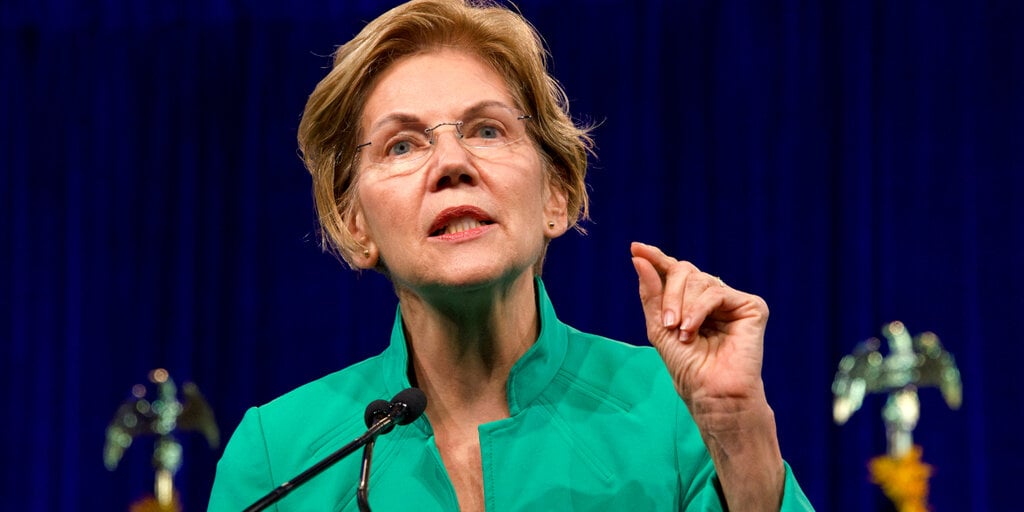U.S. Senator Elizabeth Warren (D-Mass.) is again attacking cryptocurrency, this time linking the digital asset market to child sexual abuse material (CSAM).
In a bipartisan open letter to the U.S. Department of Justice and Department of Homeland Security—cosigned by Louisiana U.S. Senator Bill Cassidy—Warren called crypto the “payment of choice for child abuse material.”
“We are writing to express our concerns regarding the use of cryptocurrency in the illegal trade of child sexual abuse material and to obtain information about the tools needed by the Department of Justice and Department of Homeland Security to end this illicit trade,” the senators wrote.
In the letter, Warren and Cassidy said cryptocurrency and the anonymity it provides facilitates trade in images and videos depicting the sexual abuse of children, pointing to a 2021 report by the International Centre for Missing and Exploited Children.
The letter also cited a February report by the U.S. Treasury Department’s Financial Crimes Enforcement Network (FinCEN) that called Bitcoin the “convertible virtual currency” (CVC) of choice for child exploitation and human trafficking between 2020 and 2021.
Out of 2,311 reports received, “2,157 reports specifically referenced bitcoin as the primary CVC used for purported [Online Child Sexual Exploitation]- and human trafficking-related activity,” FinCEN reported. No currency was specified in the remaining filings. “From this dataset, FinCEN identified over 1,800 unique Bitcoin wallet addresses related to suspected OCSE and human trafficking offenses.”
The senators also mentioned a recent “Crypto Crime Report” by blockchain analysis firm Chainalysis that noted privacy coins like Monero being adopted by CSAM vendors.
“Many CSAM vendors have adopted Monero in recent years, though Bitcoin is by far the most widely used cryptocurrency for CSAM purchasing,” Chainalysis wrote. “The data suggests Monero’s role is more prevalent in CSAM vendors’ efforts to launder their on-chain earnings, rather than to obscure the purchases themselves.”
Chainaylsis acknowledged that it was difficult to verify Monero’s role directly on-chain using standard blockchain analysis techniques but could report on CSAM vendors’ use of Monero-friendly instant exchanges as a proxy.
The office of Senator Warren did not immediately respond to a request for comment from Decrypt.
Warren and Cassidy set a May 10 deadline for the Department of Justice and Homeland Security to respond, saying it would help ensure Congress and the Biden Administration are doing their part to address challenges related to CSAM and cryptocurrency.
“Existing anti-money laundering rules and law enforcement methods face challenges in effectively detecting and preventing these crimes,” the letter said. “We are committed to ensuring that Congress and the administration have the full suite of tools needed to end CSAM and punish sellers of this material.”
In addition to asking the agencies to outline their most pressing needs, the letter asked for a current assessment of the role that cryptocurrency plays in facilitating CSAM, whether the use of cryptocurrency poses any unique challenges to efforts to identify and prosecute these crimes, and what steps they are currently taking to address them.
In her ongoing crusade to stamp out the illicit use of cryptocurrency, Warren introduced the Digital Asset Anti-Money Laundering Act in December 2022 to extend the regulatory framework that applies to traditional financial institutions to include cryptocurrency firms. Digital asset wallet providers, miners, and validators would have to comply with Know Your Customer (KYC) and Anti-Money Laundering (AML) requirements.
Last summer, Warren sounded the alarm on cryptocurrency’s use in the fentanyl trade, again calling for stronger regulations. She has also been a vocal supporter of the U.S. Securities and Exchange Commission’s actions of cryptocurrency—and called the agency’s approval of Bitcoin ETFs in January the wrong move.
“If the SEC is going to let crypto burrow even deeper into our financial system, then it’s more urgent than ever that crypto follow basic anti-money laundering rules,” Warren wrote on Twitter.
Edited by Ryan Ozawa.



